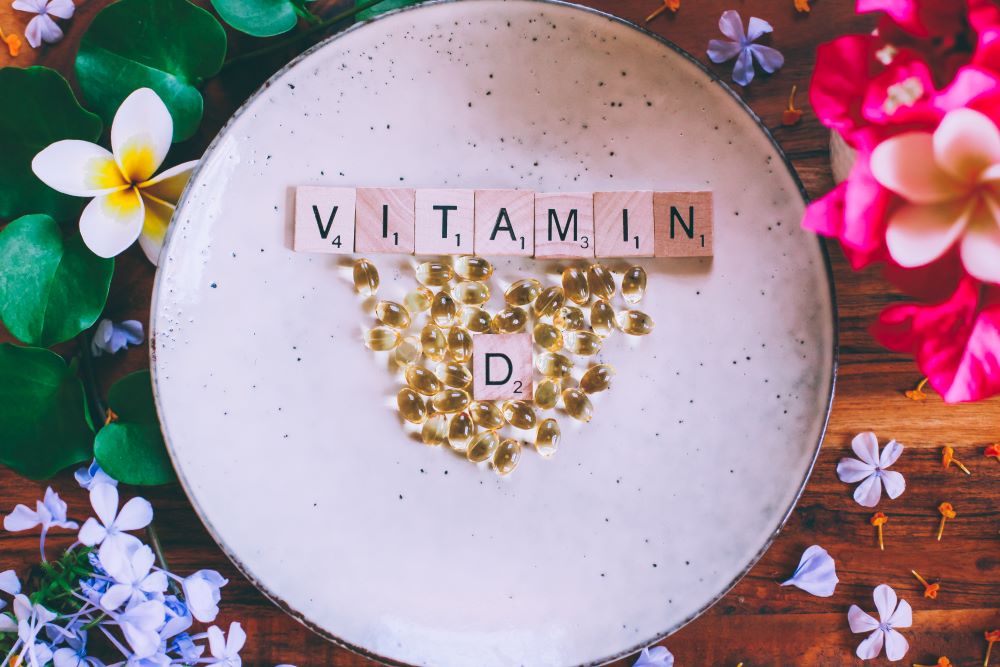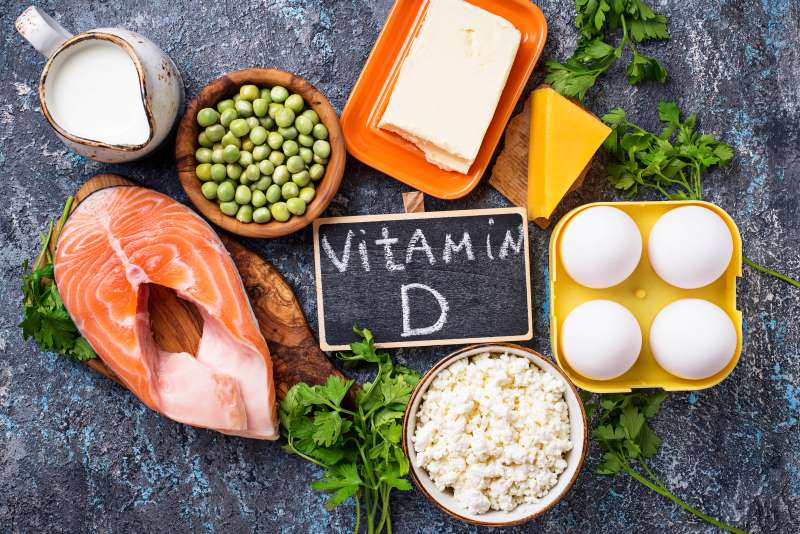12 Signs and Symptoms of Vitamin D Deficiency

Vitamin D is classified as a group of secosteroids, which are fat soluble. This particular vitamin is essential when it comes to the absorption of magnesium, phosphate and calcium in the intestine.
Vitamin D deficiency can lead to major health disorders and symptoms. This article will reveal some of the causes for such a deficiency. Moreover, you will also learn how to overcome vitamin D deficiency.
Without any delay, let’s get going!

Table of Contents

What is Vitamin D Deficiency?
When an individual lacks an adequate amount of vitamin D in the body, he/she is said to be facing a deficiency. Vitamin D presence is measured in nanograms per millilitre or ng/mL. Usually, vitamin D levels between 20 and 50 ng/mL are considered the normal levels. Thus, deficiency would be when a person shows vitamin D levels below this range.
How Common is Vitamin D Deficiency?
Lack of enough sunlight, dietary patterns and disease conditions are some of the issues resulting in vitamin D deficiency globally, affecting different categories of individuals. Certain communities do stand a higher chance of being affected, including dark-skinned people residing in areas with little sun, such as Europe, elderly people, obese persons and those who frequently cover most parts of their bodies or always use it.
Regular exposure to sunshine, taking food rich in vitamin D, or following a physician's instructions will help control its insufficiency and avoid it entirely.
What are the Signs & Symptoms of Vitamin D Deficiency?
Discover the signs and symptoms of vitamin D deficiency, essential for understanding how it affects your health. The table below details these indicators, helping you identify potential deficiencies early and take steps to improve your well-being.
Knowing the symptoms of vitamin D deficiency is important, but it's also essential to understand why it occurs. This understanding can greatly help in preventing deficiencies before they become a problem.
Reasons that Cause Vitamin D Deficiency
Vitamin D deficiency causes can be classified into the following parts:
Obesity: Vitamin D is absorbed from the blood by fat cells. Therefore, individuals with a BMI of more than 30 are always more at risk of deficiency of vitamin D.
- Failure to Consume Vitamin D Rich Foods: Vitamin D deficiency is common if you fail to eat foods rich in the same. Such foods include egg yolks, fish oil, beef liver, fish and fortified milk. This is why individuals following a vegan diet are more likely to suffer from vitamin D deficiency, as these people do not have an animal-based diet.
- Limiting Exposure to Sunlight: Lack of vitamin D Causes several severe symptoms. One of the distinct reasons for the same is inadequate exposure to sunlight. The human body can assimilate this vitamin directly from sunlight. Therefore, individuals who have limited scope or habit of venturing outside during the day face a greater risk of such deficiencies.
- Kidneys Unable to Convert Vitamin D to Usable Form: Kidney function weakens in older people. At some point, they may become unable to convert vitamin D to the active form. This malfunction can eventually lead to the concerned deficiency.
- Dark Skinned People: Melanin is known to inhibit the absorption of vitamin D from the sunlight. Thus, people in the advanced age with darker skin tone are more likely to have such a deficiency.
What are the Diagnosis of Vitamin D Deficiency?
Diagnosing vitamin D deficiency involves clinical assessment and specific tests to measure its levels in the body. Healthcare practitioners use various methods to identify and investigate this condition:
Physical Examination
A complete physical examination is done to look for symptoms such as muscle weakness, bone pain or osteomalacia manifestations (bone softening).
Dietary Assessment
An evaluation of a patient's diet can show any deficiencies, especially of foods rich in vitamin D like fatty fish like salmon and mackerel, fortified dairy products and egg yolks.
Blood Tests
The measurement of serum 25-hydroxyvitamin D (25(OH)D) levels constitutes an assessment of vitamin D status. Deficiency is generally considered when the levels are below 20 ng/mL (50 nmol/L).
Medical History Review
The medical history review includes celiac disease malabsorption syndromes, obese individuals with impaired vitamin D metabolism, and medications interfering with absorption like anticonvulsants such as some antiepileptics glucocorticoids.
Sun Exposure Assessment
Assessment of sun exposure habits and geographical location helps identify the potential for synthesis of adequate sunlight-derived vitamin D.
Bone Density Scan (optional)
For some patients, there may also be a need for a bone mineral density (BMD) test which shows their bone health or even if they have osteoporosis or not.
These diagnostic methods help healthcare providers accurately identify and manage vitamin D deficiency, tailoring treatment strategies based on individual needs and health status.
Best Food Sources to Overcome Vitamin D Deficiency

Discover a range of foods rich in vitamin D that are highlighted in the table below, essential for overcoming and preventing vitamin D deficiency to support your health and vitality.
How Much Vitamin D Do You Need Daily?
Understanding how much vitamin D your body needs daily is crucial for maintaining optimal health. Vitamin D plays a vital role in bone health, immune function, and overall well-being. The daily value (%DV) for vitamin D is 20mcg (800 IU), serving as a general target for most individuals. The Recommended Dietary Allowance (RDA) provides more specific guidelines based on age, gender, and life stage to ensure adequate intake.
Adjustments may be necessary based on factors such as sun exposure, dietary intake, and individual health conditions.
Side Effects of Vitamin D Deficiency
If you don't address early symptoms of vitamin D deficiency, you may experience persistent health issues such as the following:
- Muscle weakness
- Bone pain
- Cognitive disorders, especially in older individuals
- Increased risk of death from heart disease
- Severe asthma development in children
- Depression
- Type 2 diabetes
- Multiple sclerosis
- Frequent illness or infections
- Impaired wound healing
- Weight gain
These side effects may not always be immediately associated with a lack of vitamin D, but untreated deficiency can lead to more severe health complications. It's essential to identify and address vitamin D deficiency early through appropriate dietary adjustments, supplementation, and, if necessary, medical intervention to prevent further deterioration of health.
Diseases Caused Due to Vitamin D Deficiency
Listed below are some of the diseases caused by vitamin D deficiency:
- Individuals are likely to develop high blood pressure if the vitamin D deficiency persists for a significant period. Similarly, cardiovascular diseases can also occur as a result of such circulatory issues.
- Type 1 and type 2 diabetes are other long-term vitamin D deficiency diseases. If your body does not receive the desired level of this vitamin, you may fail to produce enough insulin or become unable to respond to this hormone. Keep in mind that diabetes has other risk factors alongside the lack of vitamin D.
- Your immune system may malfunction, causing you to fall sick more often.
- Aged people can feel disoriented, which may lead to falls and severe injuries.
- Vitamin D deficiency can also increase the risk of some types of cancers, such as breast, colon and prostate cancers.
- Multiple sclerosis can also affect people suffering from such a deficiency. In MS, the body’s immune system attacks the protective nerve coverings, causing nervous system disruptions.
Tips for Prevention Vitamin D Deficiency
Knowing the signs of vitamin D deficiency is integral if you want to prevent or treat the same. If you are wondering how to overcome vitamin D deficiencay, here are some prevention techniques –
- Supplementing vitamin D levels with oral medication.
- Spending more time under the sun to let your skin absorb a greater amount of the vitamin. Nevertheless, consult a dermatologist to know exactly how long such sun exposures should last, as too much of it can be harmful as well.
- If some underlying issue is preventing your body from absorbing the vitamin, you would need to address the same. For instance, if the deficiency results from obesity, individuals would need to lose weight to reduce deficiency risk. Consult a doctor for advice in this regard.
Prevention of vitamin D deficiency and overcoming the same involves the following procedure. However, now that you know how to prevent vitamin D deficiency, you must also find out how long it takes to restore vitamin D levels.
Treatments for Vitamin D Deficiency
Treating vitamin D deficiency involves making changes to your diet and possibly receiving medical treatment to restore healthy levels of this essential nutrient. Below are some common treatment options:
How Long Does it Take to Fix Vitamin D Deficiency?
The treatment duration depends on three major factors. The dosage of supplements recommended would also depend on these things. They are –
- Your age
- Vitamin D levels in your bloodstream
- Underlying conditions causing the deficiency if any
In most cases, vitamin D supplements are administered orally, either weekly or daily depending on the above factors. Physicians tend to lower the dosage after six to eight weeks of continuous treatment. He/she will determine how long this lower dosage treatment is necessary based on how you are responding to the same.
Disclaimer: The information in this article has been collected from various websites and journals. If you think you suffer from vitamin D deficiency, contact your physician immediately and report the same. He/she will be able to chart a suitable course of treatment for you.
As stated previously, vitamin D is a necessary micronutrient that builds bone density. Oral supplements are extremely safe with almost no side effects. One can also build the level of this vitamin by consuming specific food items rich in it. Spending a few minutes under the sun can also aid your body to form this integral micronutrient, thereby keeping you healthy.
Stay healthy and don’t forget those vitamin pills!
Who is at Risk of Suffering from Vitamin D Deficiency?
Several groups are particularly vulnerable to developing vitamin D deficiency due to factors influencing its synthesis, absorption, or utilisation in the body. Identifying these risk factors is crucial for early detection and effective management:
- Individuals with Limited Sun Exposure: Some people live where there is little sunshine while some apply sunscreen daily to avoid skin cancer at all costs.
- Older Adults: Old age comes with reduced synthesis of vitamin D by the skin and this leads to poor absorption from food.
- People with Dark Skin: Higher melanin levels reduce the skin's ability to produce vitamin D upon sun exposure.
- Obese Individuals: Vitamin D is fat-soluble and can be sequestered in adipose tissue, reducing its bioavailability.
- Infants who are Breastfed: Breast milk alone may not contain enough vitamin D, therefore, infants included will be at risk if they keep away from direct sunlight.
- People with Malabsorption Syndromes: Celiac disease, Crohn's disease and cystic fibrosis may decrease intestinal absorption of vitamin D.
- Individuals with Kidney or Liver Diseases: Cases like this make it difficult for the body to convert vitamin D into its active form.
- Those with Limited Dietary Intake: Vegans on an unfortified diet or a dairy-free diet without proper alternatives could become deficient in vitamin D.
- People on Medications that Interfere with Vitamin D Metabolism: Certain medications like glucocorticoids, anticonvulsants, or antiretrovirals can reduce vitamin D levels.
Understanding these risk factors helps in identifying individuals who may benefit from vitamin D supplementation or increased sun exposure to prevent deficiency-related health issues. Early detection and management are essential to avoid complications associated with vitamin D insufficiency.













